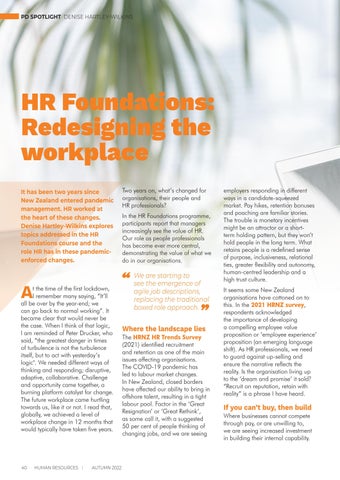PD SPOTLIGHT DENISE HARTLEY-WILKINS
HR Foundations: Redesigning the workplace It has been two years since New Zealand entered pandemic management. HR worked at the heart of these changes. Denise Hartley-Wilkins explores topics addressed in the HR Foundations course and the role HR has in these pandemicenforced changes.
A
t the time of the first lockdown, I remember many saying, “It’ll all be over by the year-end; we can go back to normal working”. It became clear that would never be the case. When I think of that logic, I am reminded of Peter Drucker, who said, “the greatest danger in times of turbulence is not the turbulence itself, but to act with yesterday’s logic". We needed different ways of thinking and responding; disruptive, adaptive, collaborative. Challenge and opportunity came together, a burning platform catalyst for change. The future workplace came hurtling towards us, like it or not. I read that, globally, we achieved a level of workplace change in 12 months that would typically have taken five years.
40
HUMAN RESOURCES
AUTUMN 2022
Two years on, what’s changed for organisations, their people and HR professionals? In the HR Foundations programme, participants report that managers increasingly see the value of HR. Our role as people professionals has become ever more central, demonstrating the value of what we do in our organisations.
We are starting to see the emergence of agile job descriptions, replacing the traditional boxed role approach.
Where the landscape lies
The HRNZ HR Trends Survey (2021) identified recruitment and retention as one of the main issues affecting organisations. The COVID-19 pandemic has led to labour market changes. In New Zealand, closed borders have affected our ability to bring in offshore talent, resulting in a tight labour pool. Factor in the ‘Great Resignation’ or ‘Great Rethink’, as some call it, with a suggested 50 per cent of people thinking of changing jobs, and we are seeing
employers responding in different ways in a candidate-squeezed market. Pay hikes, retention bonuses and poaching are familiar stories. The trouble is monetary incentives might be an attractor or a shortterm holding pattern, but they won’t hold people in the long term. What retains people is a redefined sense of purpose, inclusiveness, relational ties, greater flexibility and autonomy, human-centred leadership and a high trust culture. It seems some New Zealand organisations have cottoned on to this. In the 2021 HRNZ survey, respondents acknowledged the importance of developing a compelling employee value proposition or ‘employee experience’ proposition (an emerging language shift). As HR professionals, we need to guard against up-selling and ensure the narrative reflects the reality. Is the organisation living up to the ‘dream and promise’ it sold? “Recruit on reputation, retain with reality” is a phrase I have heard.
If you can’t buy, then build
Where businesses cannot compete through pay, or are unwilling to, we are seeing increased investment in building their internal capability.

















